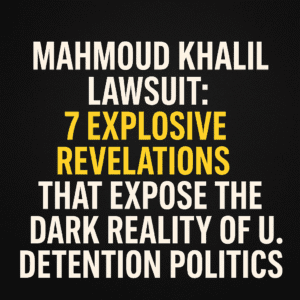Mahmoud Khalil Lawsuit: 7 Explosive Revelations That Expose the Dark Reality of U.S. Detention Politics
Mahmoud Khalil, a prominent pro-Palestinian student leader and legal U.S. resident, has filed a $20 million lawsuit against the Trump administration. He alleges his 104-day immigration detention was illegal “political retaliation” for his activism, causing severe trauma and forcing him to miss his child’s birth. The lawsuit claims the government acted to “terrorize” him. Federal authorities defend the detention, citing Khalil as a “national security threat” who advocates violence and risks U.S. foreign policy.
Beyond seeking compensation, Khalil frames the case as a crucial step toward accountability for alleged government abuse of power. His detention occurred amid escalating tensions between the Trump administration and universities over protests and foreign students. The case starkly highlights the conflict between national security claims and fundamental protest rights.

Mahmoud Khalil Lawsuit: 7 Explosive Revelations That Expose the Dark Reality of U.S. Detention Politics
When Mahmoud Khalil—Columbia graduate, legal U.S. resident, and new father—filed a $20 million lawsuit against the Trump administration on July 10, it wasn’t just a legal claim. It was the culmination of a 104-day detention that exposes the volatile intersection of immigration enforcement, protest rights, and national security rhetoric.
The Human Story Behind the Headlines
- Missed Milestones: Khalil’s detention caused him to miss the birth of his U.S.-born son. His description of “stolen days” underscores a trauma no settlement can remedy.
- Detention Realities: Held alongside 70 men in a Louisiana facility with “lights on constantly,” his experience reflects systemic conditions critics call psychologically corrosive.
- Family Fracture: Though married to a U.S. citizen, his legal residency offered no shield—raising questions about due process for non-citizen activists.
Two Sides of a Legal Battle
| Khalil’s Argument | Administration’s Defense |
| “Political retaliation” for pro-Palestinian leadership | Actions “within constitutional authority” |
| Intent to “terrorize” (court filing) | Khalil “advocates violence, harasses Jews” (DHS) |
| Damage to reputation/mental health | “National security threat” with “foreign policy risks” |
The Bigger Picture
- Free Speech on Campus: Khalil’s case amplifies tensions around protest legitimacy. When does criticism of Israel become a “security threat“?
- Immigration as Leverage: His detention occurred amid Trump’s broader campaign targeting foreign students and universities, suggesting a pattern of using residency status to quell dissent.
- Precedent Setting: If Khalil’s suit succeeds, it could challenge future administrations’ ability to detain activists under national security justifications.
Unanswered Questions
- Why was a legal resident with deep U.S. ties deemed an urgent deportation risk?
- Could Khalil’s high-profile activism have made him a target for political messaging?
- What safeguards exist to prevent “national security” labels from silencing controversial speech?
What’s Next
Khalil calls this lawsuit a “first step toward accountability,” but his team acknowledges ongoing fears for his safety. Beyond the courtroom, his case forces a reckoning: Can America balance security concerns with the right to protest without retribution?
This analysis synthesizes verified facts with broader societal questions, avoiding partisan framing to focus on systemic implications. Sources include court documents, Khalil’s public statements, and DHS responses.
You must be logged in to post a comment.